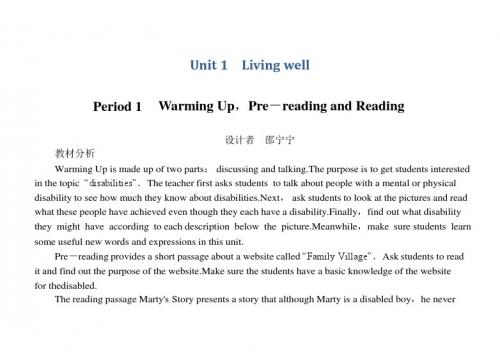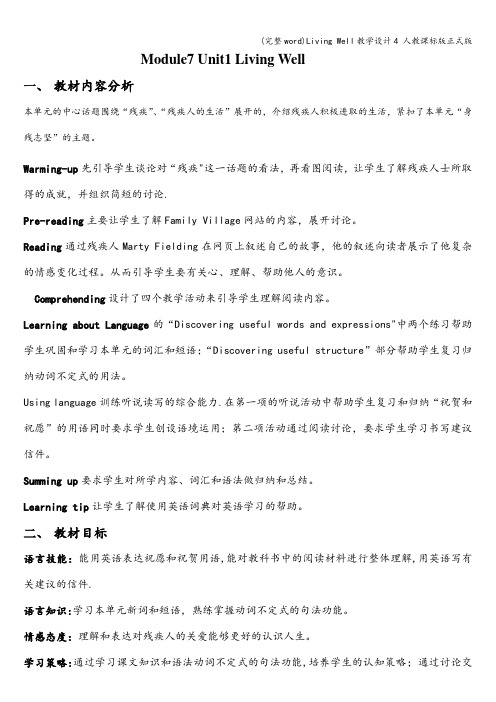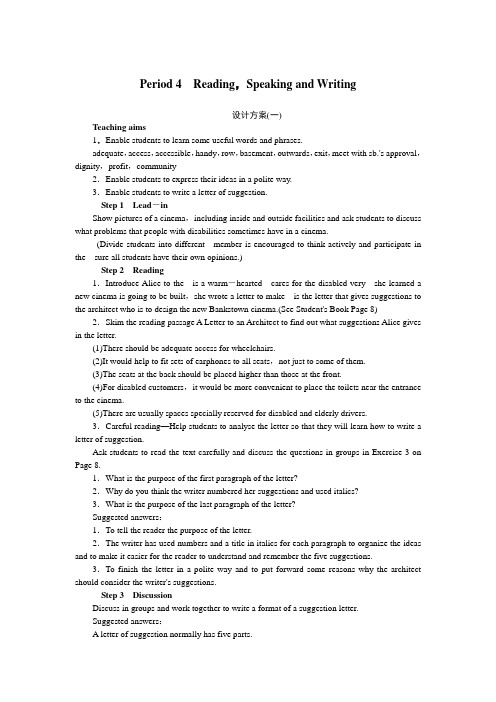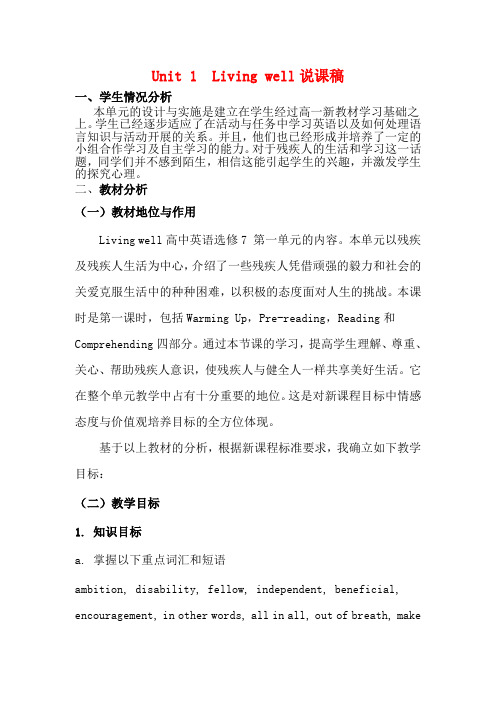【范文】高三英语Living well教案
高中英语Unit1Livingwell教案新人教版选修7

Unit 1 Living wellTeaching aims1 To teach the students to learn about Disability and Life of disabled people2 Talk about Disability and Life of disabled people3 Practise Introduction and Wishes &congratulations4 Revise the InfinitiveThe infinitive can be useda. as the subject;b. as the predicative,c. as the objectd. as the object complemente. as the adverbialf. as the attribute5 Write a letter of suggestionUseful structures1.I have learned to adapt to my disability.2.Every time after a long absence from school, I feel really stupid because I am a bitbehind the others.3.All in all, I have a good life.4.Just accept them for whom they are and give them encouragement to live as rich andfull a life as you do.课时设计和课时分派1st Warming up2nd Reading3rd Key words and phrases4th Learning about language5th Use of the Infinitive6th Practice the use of to do7th Reading and writing8th Practice分课时教案The First PeriodStep 1 Lead inShow pictures to lead the students to the topic “disability”.Do you know that there are mental and physical disabilities? Can you name some of the disabilities found around you? What kinds of abilities do you know in people around you? How are they living? Do you think people with disabilities can enjoy their life as healthy ones?Step 2 Warming upGo through the pictures given on Page 1. Try to think what makes them brave enough to enjoy their life as it is.Step 3 DiscussionDo you know any famous people with disabilities? What’s the problem of him/her? What’s he/she famous for?Steven Hawking (1942— , England), speech impaired, can only move one of his fingers, Physicist / mathematician, made a research in the beginning of space, matter and spite of his brain disease, he decides to continue with his research and writing, and his famous book “On History of Time” used to be a best seller.Helen Keller(1882—1968, United Kingdom), blind and dumb, learn to read Braille (盲文), to speak and write .Finished the studies in Radcliff College. Became famous writer---“Three days To See.”Franklin Roosevelt(1882--- 1945, America) a disease in legs and had to use wheel chair, the 32nd, 33rd and 34th president, and was selected the 35th a year before he died. The only one who was selected the president four times in American history.Beethoven (1770 – 1827, Germany) Deaf, famous musicianVincent Van Gogh(凡高), Epilepsy(癫痫症), painterZhang Haidi: writer, paralytic, in a wheelchairHu Yizhou (1978---, China) some problems in his brain. His IQ is only 30. A famous conductor (指挥家)in the Chinese Disabled Art GroupSang Lan(桑兰)(1981 --, China.),a famous gymnast (体操运动员).She hurt herself seriously in a competition and can’t stand. She helped to bid 2008 Olympic Games and helped organize the Paralympics(残疾人运动会)Discussion: What makes them successful?Spirits and characteristics needed to be successfulBravery, determination; will, power, optimism, patience, confidence, independence, and etc.Step 4 WritingGroup work. Work in groups of four and try to tell what you can learn from the disabled we talked of just now? Write five sentences to tell your group members your idea.Step 5 Summary and homeworkSurf the Internet to know something about Family Village.Preview the reading passage Marty’s Story.课后反思:___________________________________________ ___________________________________________ ___________________________________________ ___________________________________________ ___________________________________________ ___________________________________________ ___________________________________________ ___________________________________________The Second PeriodStep 1 Lead inWhat is the website mentioned in the pre-reading part? What’s it about? Yes, Family Village.Now let’s know something more about the website.Step 2 Pre-readingShow the students the following by using PPT[Abou t Us] [ What's New ] [ Site Map ] [Suggestions] [ Discussion & Chat] [ Search ]. . . . . . .. . . . . ..Welcome to the Family Village! We are a global community that integrates information, resources, and communication opportunities on the Internet for persons with cognitive and other disabilities, for their families, and for those that provide them services and support.Our community includes informational resources on specific diagnoses, communication connections, adaptive products and technology, adaptive recreational activities, education, worship, health issues, disability-related media and literature, and much, much more!So stop in, stroll around, and visit some of the Family Village's attractions. Simply click on a place to explore and discover a cornucopia of useful information! Let us know what you like (or dislike) and visit often, for our village is constantly changing.AddressThe Family VillageWaisman Center,University of Wisconsin-Madison1500 Highland AvenueMadison, WI 53705-2280So we can know if you want to know something or to share something about a disabled, you can come to Family Village for help. You can either email them or login for what you need.E-mailWWW:The Family Village Web Site is an attempt to bring together valuable information for parents of individuals who have disabilities. We hope that you find the information and resources here to be useful, but we would recommend reviewing this disclaimer first.The Family Village has been visited 2161798 times since February 13, 1996.Step 3 CheckingAs we know, there are many disabled people around the world. Some disabilities are visible, while others not. No matter what disabilities one has, life is not easy for him/her.What do you know about Marty? What’s his problem? What words do you want to use to describe him? Why? (Ex. 1 on Page 3)Get several students to answer the questions and other may add what they think is necessary.Step 4 Reading and comprehending1. Go through the passage paragraph by paragraph, and discuss in groups of four what each paragraph is about.2. Key sentences1) In other words, there are not many people like me.In other words:that’s to say (when you are about to express what you have said in a clearer, easier way). They are leaving in ten days---in other words, next Friday.2) I am very outgoing and have learned to adapt to my disability.If you adapt to a new situation or adapt yourself to it, you change your ideas or behaviours in order to deal with it successfully.. She adapted herself quickly to her new job.If you adapt something, you change it to make it suitable for a new purpose or situation.e. g. They adapted the garage for use as a workshop.If you adapt a book or play, you change it so that it can be made into a film or a TV program.e. g. They are trying to adapt this novel for a TV play.3) Every time I returned after an absence, I felt stupid because I was behind others. absence: a. the state of being awaye. g. After so long an absence from school, he will find the work difficult.It happened in my absence.b. the lack of somethinge. g. In the absence of any encouragement and support, he had to drop the plan.An absence of sleep left those workers very tired.4) The few who cannot see the real person in my body do not make me annoyed, and I just ignore them.person here means human being as individual distinct characteristics.e. g . He is nice enough as a person. (他风度专门好)annoy: make somebody a little angry or impatiente. g. It annoyed me to think how much time we had wasted.I’m annoyed with him because he kept interrupting us.5) As well as going to the movies and football matches with my friends, I spend a lot of time with my pets.As well as: in addition to something/somebody/doinge. g . The old farmer grows flowers as well as vegetables.She is a talented musician as well as a photographer.He had his school work to do, as well as looking after his sick mother.5) Just accept them for who they are, and give them encouragement to live as rich and fulla life as you do.as…ase. g . I can’t drink coffee as sweet as that.= I can’t drink as sweet coffee as that. (Pay attention to the position of “as … as”)Approach to reading:1.Set a time limit for Ex. 1 and discourage the students from using theirdictionaries, so that they are not attempted to spend time on details but ratheron gaining a general understanding of the text.2.Read more slowly again and then do Exes. 2 and3.Step 5 Summary and homework1.SummaryMarty’s mini biography. And what do you think we can learn from Marty?Marty’s Mini bioName: Marty FieldingStatus: High school studentHealth: developed a muscle disease at the age about 10, very weak, cannot do things like normal peopleInterests and Hobbies:Enjoys writing and computer programmingGoing to the movies and football matches- when I am well enoughSpending a lot of time with my pets—two rabbits, five mice, a tank full of fish and a snakeTo studyAmbition: to work in the computer industryMotto: live one day at a time2.HomeworkReview the text after class. Prepare for a dictation on the key words and phrases in Reading.Finish the exercises on Page 4.教学反思____________________________________________________________________________________________________________________________________________________________________________________________________________________________________________________________________________________________________The Third PeriodNotes: This period aims to get the students know more about the words and phrases in Reading by explaining the words and phrases and more practice. This teaching plan is also an instruction for the students’ learning.Step 1 Revision1.Dictation2.Check the homework.(Word formation in Ex. 1. Explain a word in English in . The use of some key phrases.) Step 2 Language pointsWords and expressions:1. disability n.伤残;无力;无能disabled adj.伤残的 the disabled(指代一类人)伤残人士disable vt.使丧失能力;使伤残 disablement n.残废;伤残选词填空: disability, disable, disabled, disablement1)He gets money from the Government because of his ____________.2)The ________ are to receive more money.3)She managed to lead a normal life in spite of her ___________.4)Many soldiers were ___________ in the war.5)The insurance(保险) policy covers sudden death or _____________.2. ambition n.野心;雄心ambitious adj.有雄心的;野心勃勃的be ambitious for sth/to do sth对(做)某事怀有雄心/热切的希望ambitiously adv.野心勃勃地Eg: A boy who is ambitious/filled with ambition usually works hard.完成句子:2)Mothers are often highly _____________(怀有热切的期望) their children.3)I am ____________________(热切希望能成功) in life.4)His ________________________________(要做首相的雄心) is likely to be realized.3. beneficial adj.=having a good or useful effect有利的;受益的be beneficial to… 对…有利; 对…有利 beneficially adv.受益地; 获利地beneficiary n.受惠者;受益人 benefit n.益处;帮忙vt.有利于;有助于翻译:1) 新鲜空气和优良食物有利于健康.(beneficial)Fresh air and good food are beneficial to the health.2) 他的休假已产生了有利的效果.(beneficial)His holiday has had a beneficial effect.3) 旅游业对该地域的经济将有裨益.(benefit)Tourism will benefit the economy of this district.4) 这本书对你没有多大益处.(benefit)The book isn’t of much benefit to you.4.in other words=that is to say换句话说in a/one word简言之;总之翻译:1)他们叫他离开----换句话说,他被辞退了.They asked him to leave----in other words he was fired.2) 总之,我不喜欢这份工作.In a word, I don’t like the job.3) 换句话说,他成了英雄.He became, in other words, a hero.5. adapt vt.使适应;改编adapt (oneself) to使(自己)适应 adapt sth for使某物适应;使某物适合;改编某物adapt sth from按照…改编某物 adaptable adj.能适应的;可改编的adaptation n.适应;改编本 adapter/adaptor n.适应者;改编者介词填空:1)The play is adapted _______ a novel.2)This book is adapted _______ beginners.3)When you go to a new country, you must adapt yourself ____ new customs.4)Novels are often adapted ______ the stage, television and radio.6. breath n.呼吸;气息out of breath上气不接下气catch one’s breath喘息;歇口气hold one’s breath不作声;屏息 get one’s breath (again/back)喘过气来;恢复过来lose one’s breath喘不过气来;呼吸困难 take a deep breath作一次深呼吸take breath歇口气;歇会儿take sb’s breath away使某人大吃一惊breathe vt.呼吸 breathing adj.呼吸(着)的 breathless adj.屏息的1. I was all_____ when I got to the top of the mountain.A. held my breathB. out of breathC. taken a deep breathD. taken my breath away2. We _____ while Mr Evans read the exam results.A. took a deep breathB. out of breathC. got our breath backD. held our breath7. absence n.缺席;不在(某处)absence of mind心不在焉;神不守舍 absent adj.缺席的;不在的vt.使缺席;使离开be absent from缺席;不在 presence n.出席;到场present adj.出席的;在场的;此刻的完成句子:1)Mr Green will be in charge __________________ (在我离开期间).2)Why were you __________________(缺课) yesterday?8. annoy vt.使…不悦;惹恼annoyed adj.很是生气的 annoying adj.恼人的;讨厌的annoyingly adv.恼人地;讨厌地 annoyance n.烦恼;令人烦恼的情形单句改错:1)It’s annoyed to miss a train.2)He was annoyed with the boy’s rudeness. (at/about)3)I felt annoying when he refused to help.4)To his annoy, he discovered they hadn’t waited.9. all in all总而言之above all第一;最重要的是 after all毕竟;终究 first of all第一not at all根本不;别客气 for all虽然;虽然 in all总共;总之选词填空:all in all, above all, after all, for all, in all1)He is a poor musician _________ his training.2)You must, _________, be loyal to your country.3)There are five hundred books on the shelf ______.4)Everyone makes mistakes, and _________, he is only a child.5)The book has some weak spots, but _________ I consider it a success.10. independent adj.独立自主的be independent of 不依赖;独立于 independence n.独立;自主 independently adv.独立地;自主地完成句子:1)It was the first time that she _had lived independently_ (独立生活).2)If you have a car, you _will be independent of_(不依赖) trains and buses.3)I quite like living alone, because it _makes me more independent (使我更独立).11. make fun of=laugh at 取笑for fun/in fun为了玩乐;开玩笑地 have fun玩乐选词填空: make fun of, in fun, have fun1)The kids at school used to ____________ Jill’s clothes.2)Don’t get upset. He said it was only __________.3)We ________ in camping last week.4)It’s cruel to _____________ the disabled.12. encouragement n.鼓励;奖励encourage vt.鼓励;鼓励;支持 encourage sb in sth在某事上鼓励某人encourage sb to do sth鼓励某人做某事 encouraged adj.受到鼓励的;被鼓励的encouraging adj.鼓舞人心的;鼓励的 encouragingly adv.鼓舞人心地选词填空:encouragement, encourage, encouraged, encouraging1)My mother _encouraged_ me to apply for the job.2)She felt _encouraged_ by the many letters of support.3)Praise acts as an _encouragement_ to the young.4)The results of the survey have been very encouraging.5)She was given _encouragement_ to try something new.13. conduct n.行为;品行vt.指挥;管理conduct oneself为人;表现 conductor n.管理人;指挥;售票员完成句子:1)The guide conducted the visitors round_(率领游客参观了) the museum.2)I’m glad to see _your conduct at school_(你在校的行为) has improved.3)The reporter was criticized for _unprofessional conduct_ (不专业行为).Step 3 Phrases and sentence structures1. She was proud to have recently represented her country in an athletic competition where she won a gold medal in the 50-metre race.她很自豪最近她代表她的国家参加了一次运动比赛,并博得50米赛跑的金牌.1) “to have represented”是不定式________, 表示不定式的动作发生在谓语动词was proud之___1>I am sorry _____ you waiting for such a long time.A. keepingB. having keptC. to keepD. to have kept2>He is said ______ a new book about business English.A. to writeB. to have writtenC. writingD. having written2) “where”=__________,引导的是_______从句,修饰的是________________________.2. Other disabled people find the website beneficial…其他残疾人以为那个网站很有利…“find”是______, the website是_______, beneficial是_____________. “find”后还常接____________、____________、____________、____________等作宾语补足语。
高三英语living well教案1

feels sorry for himself and he leads a good and busy life.This is the key part of this unit.The teacher can first get students to skim for the main idea of each paragraph in the reading passage,and then scan for further understanding.In order to let students fully understand the passage while reading,the teacher should analyze the change of Marty's feeling over time and next guide students to write a mini biography for Marty. To consolidate the contents of the reading passage, theteacherwill present some poems to students for appreciation. 三维目标 知识目标
Richard has difficulty with eyesight,so he can't read the questions or write the answers for his
college entrance exams. Sally has hearing problems (though not deaf as shecan still understand loud speech in the cinema). Gao Qiang was born with Down's Syndrome,which is a mental disability.Some Doun's Syndrome Down's Sufferers havemadeagood career as actors. 2 Pre-reading Ask students to read the short paragraph in Pre-reading carefully and find out the purpose of the website “Family Village”. Suggested answers: 1.To give ordinary young people with a disability achance to share their stories with othees;ask them to read the passage fast to fill in theblanks: Sum up themain idea of each paragraph:
(完整word)Living Well教学设计4 人教课标版正式版

Module7 Unit1 Living Well一、教材内容分析本单元的中心话题围绕“残疾”、“残疾人的生活”展开的,介绍残疾人积极进取的生活,紧扣了本单元“身残志坚”的主题。
Warming-up先引导学生谈论对“残疾"这一话题的看法,再看图阅读,让学生了解残疾人士所取得的成就,并组织简短的讨论.Pre-reading主要让学生了解Family Village网站的内容,展开讨论。
Reading通过残疾人Marty Fielding在网页上叙述自己的故事,他的叙述向读者展示了他复杂的情感变化过程。
从而引导学生要有关心、理解、帮助他人的意识。
Comprehending设计了四个教学活动来引导学生理解阅读内容。
Learning about Language的“Discovering useful words and expressions"中两个练习帮助学生巩固和学习本单元的词汇和短语;“Discovering useful structure”部分帮助学生复习归纳动词不定式的用法。
Using language训练听说读写的综合能力.在第一项的听说活动中帮助学生复习和归纳“祝贺和祝愿”的用语同时要求学生创设语境运用;第二项活动通过阅读讨论,要求学生学习书写建议信件。
Summing up要求学生对所学内容、词汇和语法做归纳和总结。
Learning tip让学生了解使用英语词典对英语学习的帮助。
二、教材目标语言技能:能用英语表达祝愿和祝贺用语,能对教科书中的阅读材料进行整体理解,用英语写有关建议的信件.语言知识:学习本单元新词和短语,熟练掌握动词不定式的句法功能。
情感态度:理解和表达对残疾人的关爱能够更好的认识人生。
学习策略:通过学习课文知识和语法动词不定式的句法功能,培养学生的认知策略;通过讨论交流对残疾人的不同观念,培养交际策略;让学生搜集相关话题资料和查阅英语字典,培养资源策略.文化意识:了解世界各地在不同文化背景下对残疾人的关心方式以及态度.三、教学策略以单元整体教学为原则,引导学生自主、合作、探究学习,有效利用资源和教学手段,合情合理体现任务型教学。
《Living well》 说课稿

《Living well》说课稿尊敬的各位评委老师:大家好!今天我说课的题目是“Living well”。
下面我将从教材分析、学情分析、教学目标、教学重难点、教学方法、教学过程以及教学反思这几个方面来展开我的说课。
一、教材分析“Living well”是高中英语教材中的一个重要单元,本单元的主题围绕着“健康生活”展开,涵盖了身体残疾、精神健康、积极面对生活中的困难等多个方面的内容。
教材通过阅读、听力、写作等多种形式,引导学生探讨如何在各种情况下保持良好的生活状态,培养学生的社会责任感和正确的生活态度。
本单元的教材内容丰富多样,包括了一篇关于残疾运动员克服困难实现梦想的阅读文章,一段关于心理健康问题的听力材料,以及关于如何给有困难的人提供帮助的写作任务。
这些内容不仅有助于提高学生的英语语言能力,还能启发学生对生活的思考,具有很强的教育意义。
二、学情分析我所教授的学生是高____年级的学生,他们经过了一定时间的英语学习,已经具备了一定的英语基础和语言运用能力。
但是,对于一些复杂的语言结构和较深的话题理解可能还存在一定的困难。
在学习态度方面,这个阶段的学生好奇心强,对新鲜事物感兴趣,但同时也可能存在学习动力不足、注意力容易分散等问题。
此外,学生在生活中可能对残疾人和心理健康等问题缺乏深入的了解和关注,这需要在教学过程中加以引导和启发。
三、教学目标基于对教材和学情的分析,我制定了以下教学目标:1、知识目标(1)学生能够掌握与“Living well”主题相关的词汇和短语,如“disability”“overcome”“mental health”等。
(2)学生能够理解课文中的长难句,掌握重点语法结构。
2、技能目标(1)通过阅读训练,提高学生的阅读理解能力,包括快速获取信息、推理判断、概括总结等能力。
(2)通过听力训练,提高学生的听力理解能力,培养学生捕捉关键信息的能力。
(3)通过写作训练,提高学生用英语表达自己观点和想法的能力,能够正确运用所学词汇和句型。
高中英语 Unit 1 Living well教案3

Period 4Reading,Speaking and Writing设计方案(一)Teaching aims1.Enable students to learn some useful words and phrases.adequate,access,accessible,handy,row,basement,outwards,exit,meet with sb.'s approval,dignity,profit,community2.Enable students to express their ideas in a polite way.3.Enable students to write a letter of suggestion.Step 1Lead-inShow pictures of a cinema,including inside and outside facilities and ask students to discuss what problems that people with disabilities sometimes have in a cinema.(Divide students into different member is encouraged to think actively and participate in the sure all students have their own opinions.)Step 2Reading1.Introduce Alice to the is a warm-hearted cares for the disabled very she learned a new cinema is going to be built,she wrote a letter to make is the letter that gives suggestions to the architect who is to design the new Bankstown cinema.(See Student's Book Page 8) 2.Skim the reading passage A Letter to an Architect to find out what suggestions Alice gives in the letter.(1)There should be adequate access for wheelchairs.(2)It would help to fit sets of earphones to all seats,not just to some of them.(3)The seats at the back should be placed higher than those at the front.(4)For disabled customers,it would be more convenient to place the toilets near the entrance to the cinema.(5)There are usually spaces specially reserved for disabled and elderly drivers.3.Careful reading—Help students to analyse the letter so that they will learn how to write a letter of suggestion.Ask students to read the text carefully and discuss the questions in groups in Exercise 3 on Page 8.1.What is the purpose of the first paragraph of the letter?2.Why do you think the writer numbered her suggestions and used italics?3.What is the purpose of the last paragraph of the letter?Suggested answers:1.To tell the reader the purpose of the letter.2.The writer has used numbers and a title in italics for each paragraph to organize the ideas and to make it easier for the reader to understand and remember the five suggestions.3.To finish the letter in a polite way and to put forward some reasons why the architect should consider the writer's suggestions.Step 3DiscussionDiscuss in groups and work together to write a format of a suggestion letter.Suggested answers:A letter of suggestion normally has five parts.1.The headingThis includes the address,line by line,with the last line being the a line after the heading.2.The greetingThe greeting always ends with a greeting should be formal,beginning with the word “dear”.3.The bodyAlso known as the main speaking,the body includes three first part (usually the first paragraph) tells the receiver that you are writing this letter to make suggestions on something,and the main part tells clearly what your suggestions last part (usually the last paragraph) asks the receiver to consider your suggestions.4.The complimentary closeThis short expression is always a few words in a single complimentary close begins with a capital letter and ends with a comma.5.The signature lineType or print your handwritten signature goes above this line and below the signature line and the handwritten signature are indented to the same column as the signature should be written in blue or black one to three lines(two on a typewriter),and type in the signature line—the printed name of the person signing the the name in the space between the close and the signature line,starting at the left edge of the signature line.Step 4PracticeDeal with Exercises 4-6 on Page 9.Ask students to work in groups and discuss how accessible their community is for people with discuss ways in which their community could be made more accessible for disabled people.(This discussion will lay a good foundation for the writing.)After the discussion,students are asked to write a letter of suggestion to the architect of a new building to be constructed in their the letter they will suggest ways to make it more accessible for people with writing the letter,pay attention to the format of a suggestion letter.Step 5HomeworkWrite a letter of suggestion to the architect.A sample letter:Dear Mr Smith,I read in the newspaper that you are the architect who is to design the new supermarket in our am writing to ask if you have considered the matter of easy use of the supermarket by people in particular,I wonder if you have considered the following things:1.Width of you please make sure that the aisles are wide enough to allow wheelchairs to pass through?In some supermarkets the aisles are so narrow that a person in a wheelchair cannot move along them easily.2.Height of you please design shelves that can be reached by people in wheelchairs?In some supermarkets people in wheelchairs have to ask other shoppers to help takes away their independence.3.Lifts to other could be in places that people in wheelchairs can get to is very difficult if lifts are right at the back of the shop and people have to go up and down the shelves before they get to it.4.Car hope you will leave some car spaces close to the front of the shop for people in isvery difficult if they have to park a long way away from the shop and wheel themselves over rough ground to the entrance.Thank you for reading my hope you will consider my people should have the same opportunities as able-bodied people to shop independently and they should be able to do so with am sure many people will admire your supermarket if you design it with good access for disabled supermarket owners will also be happy as more people will be able to shop there.Yours sincerely,…。
高中英语 Unit 1《Living well》教案6 新人教版选修7

Unit 1 Living well说课稿一、学生情况分析本单元的设计与实施是建立在学生经过高一新教材学习基础之上。
学生已经逐步适应了在活动与任务中学习英语以及如何处理语言知识与活动开展的关系。
并且,他们也已经形成并培养了一定的小组合作学习及自主学习的能力。
对于残疾人的生活和学习这一话题,同学们并不感到陌生,相信这能引起学生的兴趣,并激发学生的探究心理。
二、教材分析(一)教材地位与作用Living well高中英语选修7 第一单元的内容。
本单元以残疾及残疾人生活为中心,介绍了一些残疾人凭借顽强的毅力和社会的关爱克服生活中的种种困难,以积极的态度面对人生的挑战。
本课时是第一课时,包括Warming Up,Pre-reading,Reading和Comprehending四部分。
通过本节课的学习,提高学生理解、尊重、关心、帮助残疾人意识,使残疾人与健全人一样共享美好生活。
它在整个单元教学中占有十分重要的地位。
这是对新课程目标中情感态度与价值观培养目标的全方位体现。
基于以上教材的分析,根据新课程标准要求,我确立如下教学目标:(二)教学目标1. 知识目标a. 掌握以下重点词汇和短语ambition, disability, fellow, independent, beneficial, encouragement, in other words, all in all, out of breath, makefun of.b. 理解和运用以下重点句型1. I have to adapt to my disability.2. Just accept them for whom they are and give them encouragement to live as rich and full a life as you do.2. 能力目标a. 通过对段落结构的分析,使学生掌握scanning的阅读技巧。
Unit1《Livingwell》教案4(人教版选修7)
Module 7 Unit 1 Living well1.教材分析本单元以残疾及残疾人生活为话题,介绍了一些残疾人凭借顽强的毅力和社会的关爱克服生活中的种种困难,以积极的态度面对人生的挑战。
通过本单元的学习,可以帮助残疾学生树立生活的信心,激励残疾人实现自身价值;同时又能教育健康学生理解、尊重、关心、帮助残疾人,使残疾人与健全人一样共享美好生活。
通过本单元的言语技能训练,要求学生学会使用正确得体的英语介绍他人和向他人表示祝贺。
1.1 WARMING UP 让学生了解残疾的种类,讨论各种残疾给人们的生活带来的种种不便,尽管如此仍然有许多残疾人在不同领域取得了非凡成就,为本单元的READING部分精彩故事做好了铺垫。
1.2 PRE-READING 通过介绍“Family village”,激发学生的阅读兴趣。
1.3 READING课文是一篇以第一人称表述Marty身残志坚,以积极的态度快乐生活的故事。
课文以网页的形式展示,能够吸引学生的注意力,引起学生的极大兴趣。
1.4 COMPREHENSION共有4部分,这4部分的设置由表及里,由浅入深,非常科学。
第1部分是浅层次的事实核对题,旨在让学生了解Marty生活中遇到的各种困难和他对待生活的乐观态度;第2部分是深层次的理解题,要求学生在正确的理解课文的基础上,通过讨论得出结论;第3部分要求学生总结课文6段的段落大意。
第4部分要求用3-4句话分别表述1)Marty的积极向上的生活方式; 2)人们怎样帮助Marty和像Marty 一样的残疾人过上幸福生活;3)他的同学为什么改变了对待Marty的态度。
1.5 LEARNING ABOUT LANGUAGE 分为两部分,Discovering useful words and expressions是本单元词汇练习题;Discovering useful structures是本单元语法练习题练习,通过本单元的学习,要求学生熟练掌握不定式的各种语法功能。
选修7Unit1Livingwell的教学设计方案
选修7Unit1Livingwell的教学设计方案《选修7 Unit1 Living well 的教学设计方案》这是优秀的教学设计文章,希望可以对您的学习工作中带来帮助!学习主题介绍学习主题名称:选修7 unit1 Living well主题内容简介:本单元以残疾及残疾人生活为话题,介绍了一些残疾人凭借顽强的毅力和社会的关爱克服生活中的种种困难,以积极的态度面对人生的挑战及取得的成就。
通过本单元的学习,可以帮助残疾学生树立生活的信心,激励他们实现自身价值;同时又能教育健康学生理解、尊重、关心、帮助残疾人,使残疾人与健全人一样共享和谐美好生活。
学习目标分析(1) 了解残疾人所面对的各种各样困难,学习他们乐观进取,身残志坚的精神。
同时了解怎样才是真正理解,尊重,关心,帮助残疾人。
(2) 培养学生自主、合作、探究能力和创造性思维能力。
(3) 让学生为用而学,在用中学,学中用,学以致用,进行知识的积累和技能的发展。
学情分析前需知识掌握情况:学生对于残疾都有所了解,但是并没有真正意识到残疾在生活上给残疾人带来怎样的不便和他们是怎样克服生活中的困难,也不是很理解、尊重、关心、帮助残疾人。
学生有一定的英语基础,能听懂,看懂一些比较简单的英文,但大多数学生的基础偏差,学习水平有限,自主学习的能力不高,没法直接用英语来表达此话题的内容。
对微课的认识:微课是比较新型的教学模式,学生是第一次接触这种教学模式,对微课的形式、作用较陌生,有的可能听过这个用语。
但是学生对于这种新颖的方式会乐于接受,充满兴趣。
学生特征分析学习态度:微课短小精悍,偏向于视觉性和动觉型,以学生喜闻乐道的方式突破教学重难点。
学生喜欢新颖的课堂模式,也愿意分组合作,积极完成任务,学生们对于这种新型的学习方式充满兴趣。
学习风格:学生学习水平有限,自主学习的能力不高,但学生喜欢新颖的课堂模式,也愿意分组合作,积极完成任务微课用于学生学习的教学策略分析微课用于学生学习的目的:通过这个微课的学习,使得学生能够在进入本单元reading前,能够掌握一些背景知识,同时通过课前热身,提高学习兴趣,为真正进入reading做好铺垫。
高三英语《Livingwell》教案【推荐下载】
高三英语《Livingwell》教案e first in his exam.(2)请见到她时转达我的祝贺。
Please give / pass her my congratulations when you see her.4、access n.&v.根据语境猜词义(1)Only 40% of 5­year­olds have access to preschool education.(2)There is easy access to the countryside by rail.(3)Bank customers can access their checking accounts instantly through the electronic system.根据语义找匹配A. 通道;入口B. (使用某物或接近某人的)权利;机会C.接近,利用(1)B(2)A(3)Chave / get / obtain / gain access to…拥有……的机会;可以接近;进入give access to接近;准许进入accessible adj. 可接近的;可进入的;可使用的be accessible to…可接近的,可靠近的;可使用的access (to) / approach (to)access to①(……的)通道;入口The only access to that farmhouse is across the fields.②(使用某物或接近某人的)权利或机会Students must have access to good resources.approach to①(……的)路径;途径Soldiers were guarding all approaches to the palace.②(解决某一特定问题,尤其是经过深思熟虑的)方法;态度We need a fresh approach to sports in education.单项填空()(1)For professional athletes, __________ to the Olympics means that they have a chance to enter the history books.A. appealB. attachmentC. accessD. approach()(2)The people living here are __________ to the swimming pool.A. predictableB. possibleC. accessibleD. due5、in other words 换句话说根据语境感悟其用法I soon found that the work I was doing had been done by other people —in_other_words,_I’m wasting my time.我很快发现我在重复别人已做过的事情,换句话说,我是在浪费时间。
人教版高中英语选修7《Unit 1 Living well》教案2篇
人教版高中英语选修7《Unit 1 Livi ng well》教案2篇Teaching plan of unit 1 living well编订:JinTai College人教版高中英语选修7《Unit 1 Living well》教案2篇前言:英语作为在许多国际组织或者会议上都是必需语言,几乎所有学校选择英语作为其主要或唯一的外语必修课。
英语教学涉及多种专业理论知识,包括语言学、第二语言习得、词汇学、句法学、文体学、语料库理论、认知心理学等内容。
本教案根据英语课程标准的要求和教学对象的特点,将教学诸要素有序安排,确定合适的教学方案的设想和计划、并以启迪发展学生智力为根本目的。
便于学习和使用,本文档下载后内容可按需编辑修改及打印。
本文简要目录如下:【下载该文档后使用Word打开,按住键盘Ctrl键且鼠标单击目录内容即可跳转到对应篇章】1、篇章1:人教版高中英语选修7《Unit 1 Living well》教案2、篇章2:人教版高中英语选修7《Unit 1 Living well》教案篇章1:人教版高中英语选修7《Unit 1 Living well》教案教学准备教学目标教学目标(这部分谢3点,按照USE的目标写)(1)学习建议信的结构、语言。
(2)讨论学校建筑物设计中行走不便的学生的需求。
(3)给校长写一封建议信。
(4)继续培养对残疾人的尊重和关爱意识。
教学重难点教学目标(这部分谢3点,按照USE的目标写)(1)学习建议信的结构、语言。
(2)讨论学校建筑物设计中行走不便的学生的需求。
(3)给校长写一封建议信。
(4)继续培养对残疾人的尊重和关爱意识。
教学过程Step 1Warming-up and lead-in (5 mins)(1)导入用本单元的阅读文Marty’s story来导入,引出残疾人的话题。
T: Hello, class. Inthe last lesson, we learnt Marty’s story. What’s the problem with Marty?(He has a raremuscle disease.)Yes, he’sdisabled.But is Martyleading a miserable life due to his disability?(No.)He is leading afulfilling life due to his own efforts. The disabled can live as good andcomfortable a life as we do. But it calls for more efforts.(2)揭题教师通过展示我们学校的图片以及通过采访班上一位曾经有行走困难的学生,点出学校有些地方可能对行走困难学生带来不便。
- 1、下载文档前请自行甄别文档内容的完整性,平台不提供额外的编辑、内容补充、找答案等附加服务。
- 2、"仅部分预览"的文档,不可在线预览部分如存在完整性等问题,可反馈申请退款(可完整预览的文档不适用该条件!)。
- 3、如文档侵犯您的权益,请联系客服反馈,我们会尽快为您处理(人工客服工作时间:9:00-18:30)。
高三英语Living well教案Unit1 Livingwell1、adaptv.根据语境猜词义Howdotheseinsectsadaptthemselvestonewenvironments?youcanadaptthisfabricforanythingfromdivers'suitstog loves.manychildrenbuybooksaftertheyhavebeenadaptedfortele vision.根据语义找匹配A.改造;改装B.改编;改写 c.适应;适合c A Badaptoneselfto…使自己适应或习惯于……adaptto适应adaptsth.forsth.改造;改装adapt…from…根据……改写/改编adaptableadj.适应力强的;适用面广的adaptationn.适应;改编;改造adapt/adjust/fit/suit/match它们都有“适合,适应”的意思。
adapt指修改或改变,使某物或某人做些改变以适应新条件。
youshouldadaptyourselftothenewenvironment.adjust指借正当的判断或熟练的技巧“调整,调节”,以使两者互相适应。
youcan'tseethroughthetelescopeuntilitisadjustedtoyo ureyes.fit指大小适合,引申为“吻合”。
Theshoesfitmewell.suit多指合乎要求、口味、性格或情况。
Nodishsuitsalltastes.match指大小、色调、形状或性质等相配或相称。
Aredjacketdoesn'tmatchgreentrousers.用适当的介词填空Theplayisadaptedfromamichaelcrichtonnovel.Thisteachingmaterialcanbeadaptedforolderchildren.whenyougotoanewcountry,youmustadaptyourselftonewcus toms.、adaptv.2、conductn.&vt.根据语境猜词义weareconductingasurveyofconsumerattitudestowardsorg anicfood.Non­metalssuchaswood,glassandplasticcannotcondu ctheateasily.Theorchestraisconductedbyjohnwilliams.“Ican'tscoldyourcheatingontheexamination,”saidafathertohisson.“ButI'mgladthatyouconduct_yourselfhonestlynexttime .”whyhashisfellowstudents'conductchangedtowardsmarty?根据语义找匹配A.指挥B.为人;表现c.导D.实施;进行E.行为D c A B Econductasurvey/investigation进行调查conductoneself表现conductiveadj.具有传导性的conductorn.指挥;售票员用conduct的适当形式填空yesterdayourchemistryteacherconductedanexperimenton woodtoseewhetheritisconductive,aftertheexperimentwedrewaconclusionthatwoodisapoorc onductorofheat.3、congratulatevt.根据语境猜词义Shecongratulatedmewarmlyonmyexamresults.Icongratulatemyselfonmygoodfortune.根据语义找匹配A.祝贺;向……道喜B.为……感到高兴A Bcongratulatesb.onsth./congratulatesb.fordoingsth.祝贺某人做了某事congratulateoneselfonsth./congratulateoneselffordoi ng/havingdonesth.庆幸自己做了某事congratulationn.恭喜;祝贺Pleaseacceptmysincerecongratulationsonyourmarriage.谨以至诚祝贺你们喜结良缘。
congratulate/celebrate两者的意思很接近,但在英语中却有所不同。
congratulate意思是“祝贺,道贺”,只能用人作宾语,若要表明所祝贺的事情,后面要用on连接,构成congratulatesb.on/uponsth.wecongratulatedheronwinningthecontest.Iwillcongratulateyouon/uponyoursuccess.celebrate意思是举行仪式、典礼的“庆祝”,只能用事作宾语,构成celebratesth.wehadapartytocelebrateparents'silverwedding.Theywillcelebrateyourbirthdaynextweek.翻译句子我们祝贺他考试得了第一名。
wecongratulatedhimonhavingcomefirstinhisexam.请见到她时转达我的祝贺。
Pleasegive/passhermycongratulationswhenyouseeher.4、accessn.&v.根据语境猜词义only40%of5­year­oldshaveaccesstopreschooled ucation.Thereiseasyaccesstothecountrysidebyrail.Bankcustomerscanaccesstheircheckingaccountsinstantl ythroughtheelectronicsystem.根据语义找匹配A.通道;入口B.权利;机会c.接近,利用B A chave/get/obtain/gainaccessto…拥有……的机会;可以接近;进入giveaccessto接近;准许进入accessibleadj.可接近的;可进入的;可使用的beaccessibleto…可接近的,可靠近的;可使用的access/approachaccessto①通道;入口Theonlyaccesstothatfarmhouseisacrossthefields.②权利或机会Studentsmusthaveaccesstogoodresources.approachto①路径;途径Soldierswereguardingallapproachestothepalace.②方法;态度weneedafreshapproachtosportsineducation.单项填空Forprofessionalathletes,__________totheolympicsmean sthattheyhaveachancetoenterthehistorybooks.A.appealB.attachmentc.accessD.approachThepeoplelivinghereare__________totheswimmingpool.A.predictableB.possiblec.accessibleD.due5、inotherwords换句话说根据语境感悟其用法IsoonfoundthattheworkIwasdoinghadbeendonebyotherpeople—in_other_words,_I'mwastingmytime.我很快发现我在重复别人已做过的事情,换句话说,我是在浪费时间。
keepone‘sword遵守诺言breakone'sword失信,食言eatone‘swords承认说错了话getinaword插话leaveword留言haveawordwithsb.与某人谈一谈havewordswithsb.与某人争吵ina/oneword简言之;总之beyondwords无法用言语表达withthesewords说完这些话wordcamethat…有消息传来说……sb.sentwordthat…某人传来消息……wordcamethatourdutieswouldbechanged.有消息说我们的职责会有变动。
Hesentwordbyanarmymessengerthattheyhadarrivedinjaka rta.他通过通信兵传送消息说他们已经达到雅加达。
inotherwords/Imeaninotherwords换句话说,也就是说Hedecidedtoquitthejob.Inotherwords,hehadtofindanoth erjobinstead.Imean我是说wecouldn'tliveonthat!Imean,itisridiculous.用word的适当短语填空Nackisgood,kind,hard­workingandintelligent;ina/ oneword,Ican'tspeaktoohighlyofhim.Icannottrusthimanymorebecausehedidnotkeephisword.withthesewords,helefttheroomhurriedly.Beethovenwrotemanyworld­famousmusicalcompositio ns.Inotherwords,hewasagreatmusician.youalsocanleavewordonline,wereallyappreciateyourpro posal.6、outofbreath上气不接下气根据语境感悟其用法Afterclimbingthatlongflightofstairsshewascompletelyout_of_breath.爬完那么长的一段楼梯后,她已经完全喘不过气来了。
outofsight看不见outofcontrol失控outofdate过期,过时outoforder出毛病;混乱outofwork失业outofpatience不能忍受outofquestion没问题;无疑;毫无疑问outofthequestion不可能的;办不到的outoffashion过时,不流行outofreach够不着outoftouch失去联系outofplace不适合outofcash钱用光了用outof的相关短语填空TheFordcarwentoutofcontrolandcrashedoverthecliff.Somepopularsongsgooutoffashion/datesoon.Thismedicineisoutoforder. HardlyhadIopenedthedoorwhenherushedintotheofficeoutofbreath.1.Thegoodthingaboutchildrenisthatthey______veryeasi lytonewenvironments.A.adaptB.appealc.attachD.apply…butIamveryoutgoingandhavelearnedto_adapt_tomydisabi lity.A 本题考查动词词义辨析。
